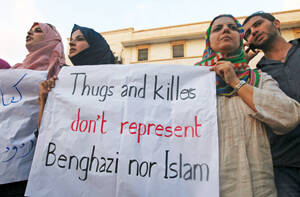Reality intruded darkly on a symposium convened in Washington to discuss the challenges facing religious freedom worldwide when news alerts reported the killing of J. Christopher Stevens, 52, the U.S. ambassador to Libya, and three other Americans at the U.S. consulate in Benghazi on Sept. 11. The Americans were killed, along with several Libyan security officers, when the consulate became the target of mob rage, perhaps exploited by a coordinated terrorist attack. An amateurish YouTube video, produced by an American, denigrating Mohammed and the Muslim faith had generated outrage throughout the Middle East.
Academic presentations on threats to religious expression at the symposium, titled “International Religious Freedom: An Imperative for Peace and the Common Good,” were quickly revised on Sept. 12 to include messages of dismay and prayers for the fallen ambassador.
Cardinal Timothy Dolan of New York, president of the U.S. Conference of Catholic Bishops, called violence in the name of religion the “ultimate oxymoron.” He said the day’s events in the Middle East lent urgency to the discussion of religious freedom. “We need to be respectful of other religious traditions,” said Cardinal Dolan, “at the same time that we unequivocally proclaim that violence in the name of religion is wrong.” Around the world, he said, 150,000 Christians, one of the most persecuted faith groups, are killed every year. This means, Cardinal Dolan said, “we have 17 new martyrs every hour of every day.”
A presentation by Denis McDonough, the national security advisor, was delayed by events in Libya as the Obama administration grappled with the unfolding crisis. McDonough’s well-scripted appearance wavered only briefly when he seemed to struggle to keep his composure during a small tribute to Ambassador Stevens. Later he shared some thoughts about the nation’s loss.
“I was really blessed,” McDonough said. “I had the opportunity to work with him, and I got to know him over the course of the last year and a half. He’s a guy for whom I had a tremendous amount of respect; we’re going to miss him a lot.”
McDonough described the killing of Ambassador Stevens as a tremendous setback for the people of Libya, particularly for the people of Benghazi, where the resistance to Col. Muammar el-Qaddafi had first coalesced. McDonough said, “He in many ways gave his life for the freedom of Benghazi,” recalling that Stevens was in the then beleaguered city when Qaddafi threatened to obliterate the resistance “in those tenuous days in February and March 2011 when we thought Benghazi was going to be reduced to rubble.”
The president’s decision last year to throw U.S. military might behind NATO forces in a “responsibility to protect” air campaign to defend Libyan noncombatants, then the resistance itself, was controversial. Now McDonough anticipates that decision will be second-guessed because of the violence. He remains confident it was the right call.
“We’re working every day to make sure that the Libyans, who have a unique opportunity now, make everything of that opportunity,” he said. “There are going to continue to be Libyans who choose a path of hate and violence, and it’s our job to make sure that we promote the kind of security that the overwhelming majority of Libyans want.”
McDonough noted that both President Obama and Secretary of State Hillary Clinton had that morning underscored the continuing U.S. support of the Libyan government. He added, “That said, we need to see some progress on the investigation of this heinous attack; we need to bring the perpetrators to justice. We’re going to rely on our Libyan partners in that regard, but I’ll also say this: we’re not going to rest until we find these guys.”
The meeting was sponsored jointly by the Institute for Policy Research and Catholic Studies at the Catholic University of America, the United States Conference of Catholic Bishops and Catholic Relief Services.








